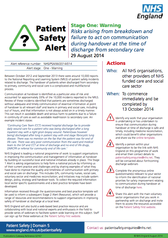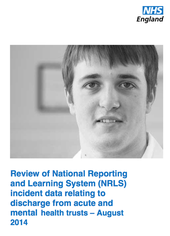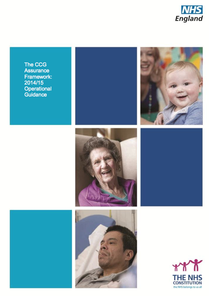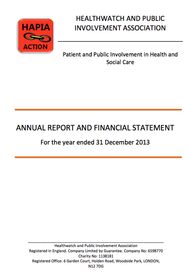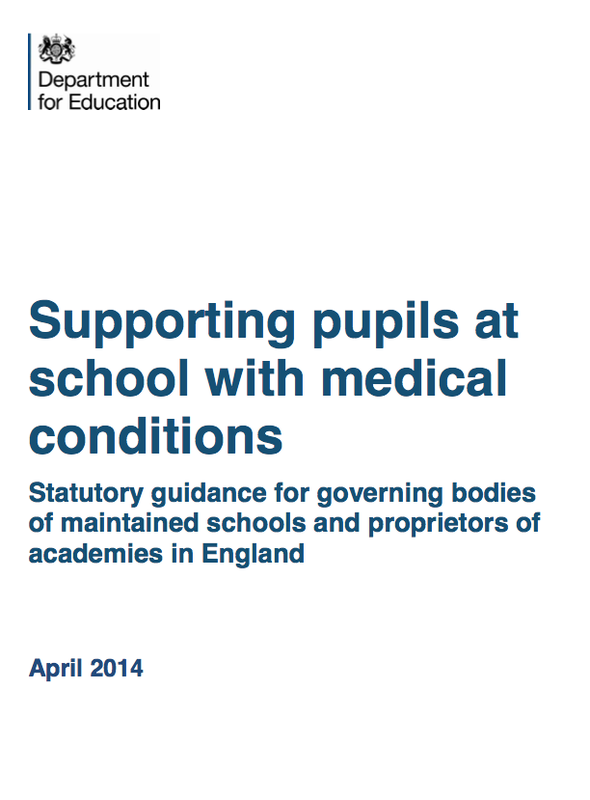NEWS - AUGUST 2014
MANDATORY, CONTRACTUAL FOOD STANDARDS FOR HOSPITALS
The Department of Health - 29 August 2014
The NHS will have mandatory food standards and hospitals will be ranked on food quality as part of a wide-ranging drive to raise standards of hospital food across the country.
The Department of Health - 29 August 2014
The NHS will have mandatory food standards and hospitals will be ranked on food quality as part of a wide-ranging drive to raise standards of hospital food across the country.
- Mandatory food standards in the NHS contract for the first time
- Hospitals rated for food quality on NHS Choices
NHS COMPLAINTS - 'TIP OF THE ICEBERG'
29 August 2014 - Press Association
NHS England receives 480 written complaints a day, with hospital doctors and surgeons among those bearing the brunt of patients’ frustrations, new figures show.
There were almost 175,000 written complaints about the health service in 2013-14 - the equivalent of 3,300 a week - according to the Health and Social Care Information Centre.
29 August 2014 - Press Association
NHS England receives 480 written complaints a day, with hospital doctors and surgeons among those bearing the brunt of patients’ frustrations, new figures show.
There were almost 175,000 written complaints about the health service in 2013-14 - the equivalent of 3,300 a week - according to the Health and Social Care Information Centre.
|
NATIONAL PATIENT SAFETY ALERT RE DISCHARGE FROM HOSPITALS
A patient safety alert has been issued by NHS England as part of its work to improve the quality and timeliness of communication with primary and social care when patients are discharged from hospital. http://www.england.nhs.uk/2014/08/29/psa-communication/ |
INFORMATION FOR HEALTHWATCH 72
27th August 2014
Information for Healthwatch aims to pick up DH, CQC, LGA, NHSE, HWE, Monitor and other reports that Local Healthwatch will need to know about and to pass on other information I glean from other sources, including the King's Fund Health Policy and Management Alerts, Social Care Institute for Excellence, National Voices and HAPIA (NALM). It can't be comprehensive, so if you know of anything I should include please let me know, E&OE!
27th August 2014
Information for Healthwatch aims to pick up DH, CQC, LGA, NHSE, HWE, Monitor and other reports that Local Healthwatch will need to know about and to pass on other information I glean from other sources, including the King's Fund Health Policy and Management Alerts, Social Care Institute for Excellence, National Voices and HAPIA (NALM). It can't be comprehensive, so if you know of anything I should include please let me know, E&OE!
- Avoid unplanned hospital admissions
- Quality Watch
- Dental Services
- A national review of choices in end of life care
- Voluntary sector involvement in Better Care Fund planning
- Help for NHS to recover costs of care from visitors and migrants
- NHS patient, visor and staff car parking principles
CAR PARKING GUIDANCE
NHS patient, visitor and staff car parking principles.
23 August 2014
https://www.gov.uk/government/publications/nhs-patient-visitor-and-staff-car-parking-principles/nhs-patient-visitor-and-staff-car-parking-principles
NHS patient, visitor and staff car parking principles.
23 August 2014
https://www.gov.uk/government/publications/nhs-patient-visitor-and-staff-car-parking-principles/nhs-patient-visitor-and-staff-car-parking-principles
|
CCG ASSURANCE REPORTING
31 pages See Anna Bradley's letter of concern (below) "... CCG assurance reporting. In particular, I will be asking for assurance of the delivery of Domain 2, which asks whether 'patients and the public actively engaged and involved' in the decision-making" ... |
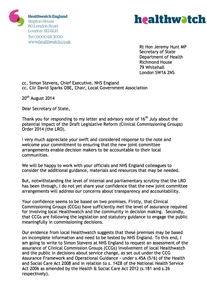 Click the image to download the letter
Click the image to download the letter
LOCAL HEALTHWATCH SIDELINED AGAIN
Hunt backs legal measure to ease creation of 'super CCGs'
24 August 2014
Healthwatch England’s bid to secure seats for patient champions on all ‘super clinical commissioning groups’ has been dashed by the Health Secretary in a letter rejecting claims such structures are unaccountable. Jeremy Hunt’s response comes after Healthwatch Chair, Anna Bradley accused CCGs of undermining her organisation’s role by “clubbing together” in closed groups to discuss reshaping health services across wide areas.
In a letter to Mr Hunt last month, Ms Bradley called for the health secretary to strengthen accountability measures by amending a legal order which is expected to ease the formation of super CCGs. She also urged Mr Hunt to give local Healthwatch bodies non-voting seats on any joint committees established by CCGs.
The Health Secretary responded in a letter last week, stating he was “not proposing further legislative change to amend the order”. His letter said the new arrangements would “not circumvent any of the existing duties” of CCGs to consult with communities.
Ms Bradley’s request for local Healthwatch representatives to have non-voting seats would be “contrary to the permissive and flexible nature of the legislation in relation to CCGs”, it said. “It is right that local clinicians have the autonomy to determine the structures that will work best to deliver services for their local population.”
Mr Hunt said he had asked the Department of Health and NHS England to consider what additional “good practice resources” may be required to “support effective and accountable collaboration between CCGs”. Responding to Mr Hunt’s letter, Healthwatch England [ see attached letter] said it did not share his confidence in the new arrangements because they were concerned CCGs had not properly fulfilled their duties to consult with communities to date.
Ms Bradley has now asked NHS England to review how effectively CCGs have engaged with local Healthwatch and the public. NHS Clinical Commissioners said they agreed with Mr Hunt that the current arrangements to ensure accountability were sufficient.
Director Julie Wood said: “We would agree with the secretary of state that CCGs’ statutory responsibility to ensure they have strong transparent and accountable patient and population engagement in their plans, through Healthwatch and local CCG mechanisms, are already in place. “There is no need for any further legislation or top down mandatory requirements of CCGs.”
Hunt backs legal measure to ease creation of 'super CCGs'
24 August 2014
Healthwatch England’s bid to secure seats for patient champions on all ‘super clinical commissioning groups’ has been dashed by the Health Secretary in a letter rejecting claims such structures are unaccountable. Jeremy Hunt’s response comes after Healthwatch Chair, Anna Bradley accused CCGs of undermining her organisation’s role by “clubbing together” in closed groups to discuss reshaping health services across wide areas.
In a letter to Mr Hunt last month, Ms Bradley called for the health secretary to strengthen accountability measures by amending a legal order which is expected to ease the formation of super CCGs. She also urged Mr Hunt to give local Healthwatch bodies non-voting seats on any joint committees established by CCGs.
The Health Secretary responded in a letter last week, stating he was “not proposing further legislative change to amend the order”. His letter said the new arrangements would “not circumvent any of the existing duties” of CCGs to consult with communities.
Ms Bradley’s request for local Healthwatch representatives to have non-voting seats would be “contrary to the permissive and flexible nature of the legislation in relation to CCGs”, it said. “It is right that local clinicians have the autonomy to determine the structures that will work best to deliver services for their local population.”
Mr Hunt said he had asked the Department of Health and NHS England to consider what additional “good practice resources” may be required to “support effective and accountable collaboration between CCGs”. Responding to Mr Hunt’s letter, Healthwatch England [ see attached letter] said it did not share his confidence in the new arrangements because they were concerned CCGs had not properly fulfilled their duties to consult with communities to date.
Ms Bradley has now asked NHS England to review how effectively CCGs have engaged with local Healthwatch and the public. NHS Clinical Commissioners said they agreed with Mr Hunt that the current arrangements to ensure accountability were sufficient.
Director Julie Wood said: “We would agree with the secretary of state that CCGs’ statutory responsibility to ensure they have strong transparent and accountable patient and population engagement in their plans, through Healthwatch and local CCG mechanisms, are already in place. “There is no need for any further legislation or top down mandatory requirements of CCGs.”
THE NEW CQC INSPECTION REGINE FOR GPs
The CQC is inspecting practices as part of its new-look regime. It will begin handing out ratings from October this year. It is going to inspect all providers of general practice, including out-of-hours providers, by April 2016.
The CQC is inspecting practices as part of its new-look regime. It will begin handing out ratings from October this year. It is going to inspect all providers of general practice, including out-of-hours providers, by April 2016.
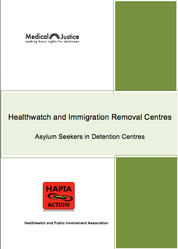
HEALTHWATCH AND IMMIGRATION REMOVAL CENTRES
Asylum Seekers in Detention Centres
HAPIA Report - August 2014 - 26 pages
Asylum Seekers in Detention Centres
HAPIA Report - August 2014 - 26 pages
DH SETS HEALTH VISITING SERVICES PROVISION FOR LOCAL AUTHORITIES
The Department of Health will expect councils to provide health visiting services in five key areas when they take over the role of commissioning the services from the NHS next year.
According to DH guidance issued this week, the mandated services are:
The five manadated services listed in the guidance are currently commissioned by the NHS under its Healthy Child Programme.
The Department of Health will expect councils to provide health visiting services in five key areas when they take over the role of commissioning the services from the NHS next year.
According to DH guidance issued this week, the mandated services are:
- antenatal health promoting reviews;
- new baby reviews;
- six to eight week assessments;
- one year assessments; and
- two to two and a half year reviews.
The five manadated services listed in the guidance are currently commissioned by the NHS under its Healthy Child Programme.
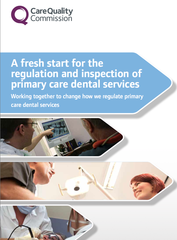
CQC - INSPECTION FOR DENTAL SERVICES
16 pages
A fresh start for the regulation and inspection of primary car dental services
16 pages
A fresh start for the regulation and inspection of primary car dental services
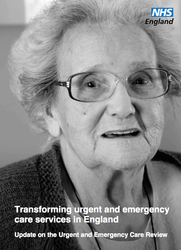
UPDATE ON URGENT CARE REVIEW
13 pages
For example:
NHS 111 must be able to directly book an appointment with the urgent or emergency care service that can deal with the patient’s problem, as close to their location as possible (which could include a booked call back from a GP, a pharmacist review at a community pharmacy, an appointment at an urgent care centre, an appointment with GP out of hours services, a home visit, or (in due course) an appointment within a hospital emergency department).
13 pages
For example:
NHS 111 must be able to directly book an appointment with the urgent or emergency care service that can deal with the patient’s problem, as close to their location as possible (which could include a booked call back from a GP, a pharmacist review at a community pharmacy, an appointment at an urgent care centre, an appointment with GP out of hours services, a home visit, or (in due course) an appointment within a hospital emergency department).

MUTUALISATION OF NHS SERVICES
Mutuals in Health: Pathfinder Programme - 28 July 2014
The Department of Health and Cabinet Office launched a joint initiative on 15 July 2014 to support health and care organisations explore the potential advantages of mutualising their services.
The Pathfinder Programme is designed to support a small number of pioneering trusts, either individually or in partnership. It is open to all Foundation Trusts and NHS Trusts.
More details at: https://www.gov.uk/government/publications/mutuals-in-health-pathfinder-programme
Mutuals in Health: Pathfinder Programme - 28 July 2014
The Department of Health and Cabinet Office launched a joint initiative on 15 July 2014 to support health and care organisations explore the potential advantages of mutualising their services.
The Pathfinder Programme is designed to support a small number of pioneering trusts, either individually or in partnership. It is open to all Foundation Trusts and NHS Trusts.
More details at: https://www.gov.uk/government/publications/mutuals-in-health-pathfinder-programme
INFORMATION FOR HEALTHWATCH
- Congenital Heart Disease Review
- Contracts Guidance for CCGs
- NHSE Bulletin for CCGs
- Consultation on Funding Formulae for Implementation of the Care Act in 2015 / 2016
- Better Care Fund Planning Templates
- NHSE Update on Berwick
- Commissioning for Quality
|
NEW LEGISLATION - IMPACT ON GPs
GPs could see a spike in requests to provide reports, medical letters or certificates for schools as a result of new legislation, passed without consultation with GP bodies. The Children and Families Act 2014 - due to come into force in September - places a statutory duty on schools to have formal arrangements in place for pupils with medical conditions, and supporting guidance for schools highlights GPs as an example of a health professional to approach in developing medical arrangements and training staff. |
DEPARTMENT OF HEALTH - FREEDOM TO SPEAK UP REVIEW
Letter from: Sir Robert Francis, QC
Launch of a website to support his review of how to create an open and safe reporting culture in the NHS.
Website address: www.freedomtospeakup.org.uk
Click here to download the letter
Letter from: Sir Robert Francis, QC
Launch of a website to support his review of how to create an open and safe reporting culture in the NHS.
Website address: www.freedomtospeakup.org.uk
Click here to download the letter
|
REVISED GUIDANCE FOR BETTER CARE FUND
13 pages The Better Care Fund (BCF) was announced in June 2013. It provides an opportunity to transform local services so that people are provided with better integrated care and support. Every local area submitted a plan in April and these plans clearly demonstrated a commitment to ensuring more people received joint-up personalised care closer to home. |
DEPARTMENT OF HEALTH EVALUATION OF LOCAL HEALTHWATCH
The DH have released a tender this week for a ‘report into the impact and effectiveness of local Healthwatch’. The contract value is around £75,000 and the report is due to be delivered in December 2014.
More info is available at: http://www.government-online.net/report-impact-effectiveness …
The DH have released a tender this week for a ‘report into the impact and effectiveness of local Healthwatch’. The contract value is around £75,000 and the report is due to be delivered in December 2014.
More info is available at: http://www.government-online.net/report-impact-effectiveness …
HAPIA - DES
05 August 2014
GP practices signed up to do the new ‘avoiding unplanned admissions’ DES. The DES is worth £20,400 to the average practice, the money sourced by scrapping 40% of the QOF for this year’s GP contract.
05 August 2014
GP practices signed up to do the new ‘avoiding unplanned admissions’ DES. The DES is worth £20,400 to the average practice, the money sourced by scrapping 40% of the QOF for this year’s GP contract.

ICO TO EXAMINE INSURERS' USE OF GP INFORMATION
28 July 2014
The ICO is looking at how insurers use patient information. The Information Commissioner’s Office is examining why insurance companies are requesting patients’ full medical records from GP practices instead of using standard procedures to obtain relevant information. A GP who received one of the requests is concerned that the companies may be breaching the principles of the Data Protection Act.
In a SAR consent form for the patient, the company said it would disregard any information it was sent that was not related to the application “unless the information will help us to make a more favourable decision”.
Dr Cundy said he is concerned that insurance companies’ use of SARs breaches the third principle of the Data Protection Act, which states that “personal data shall be adequate, relevant and not excessive in relation to the purpose…for which they are processed. In the letter, they admit to receiving information that goes beyond their purpose, so they’re breaking the law.”
“An SAR is not designed for insurance purposes: the law is very clear that disclosure for insurance purposes needs to happen under a significantly different set of guidelines.”
An ICO spokesman told EHI it is “making enquiries” into how insurance companies are using SARs and whether their use fits with the Data Protection Act.
“These [SAR] requests are powerful and lead to all of the information held by an organisation being disclosed.
“There are already specific means for insurers to find out relevant medical information with appropriate safeguards.”
28 July 2014
The ICO is looking at how insurers use patient information. The Information Commissioner’s Office is examining why insurance companies are requesting patients’ full medical records from GP practices instead of using standard procedures to obtain relevant information. A GP who received one of the requests is concerned that the companies may be breaching the principles of the Data Protection Act.
In a SAR consent form for the patient, the company said it would disregard any information it was sent that was not related to the application “unless the information will help us to make a more favourable decision”.
Dr Cundy said he is concerned that insurance companies’ use of SARs breaches the third principle of the Data Protection Act, which states that “personal data shall be adequate, relevant and not excessive in relation to the purpose…for which they are processed. In the letter, they admit to receiving information that goes beyond their purpose, so they’re breaking the law.”
“An SAR is not designed for insurance purposes: the law is very clear that disclosure for insurance purposes needs to happen under a significantly different set of guidelines.”
An ICO spokesman told EHI it is “making enquiries” into how insurance companies are using SARs and whether their use fits with the Data Protection Act.
“These [SAR] requests are powerful and lead to all of the information held by an organisation being disclosed.
“There are already specific means for insurers to find out relevant medical information with appropriate safeguards.”
NICE'S FULL MENU OF CHANGES TO QOF INDICATORS FOR 2015 / 2016
National Institute for Health and Care Excellence - 01 August 2014
6 pages
This paper provides a summary of the latest set of indicators NICE has published for inclusion within the NICE Quality and Outcomes Framework (QOF) menu. Amendments to the NICE QOF indicator menu include a number of new indicators and amendments to existing QOF indicators to reflect an update in the underpinning NICE guidance.
National Institute for Health and Care Excellence - 01 August 2014
6 pages
This paper provides a summary of the latest set of indicators NICE has published for inclusion within the NICE Quality and Outcomes Framework (QOF) menu. Amendments to the NICE QOF indicator menu include a number of new indicators and amendments to existing QOF indicators to reflect an update in the underpinning NICE guidance.
GUIDANCE ON PUBLISHING NEW CONTRACT OPPORTUNITIES FOR NHS HEALTH CARE SERVICES
This document we focuses on providing guidance for commissioners on the National Health Service (Procurement, Patient Choice and Competition) (No. 2) Regulations 2013. These regulations are also sometimes referred to as the “section 75 regulations” or “the commissioner regulations”.
While the regulations replace the previous administrative rules governing the procurement of NHS-funded services set out by the Department of Health (in Principles and rules for cooperation and competition and Procurement guide for commissioners of NHS-funded services), the substance of the former rules is preserved within them.
https://www.gov.uk/government/uploads/system/uploads/attachment_data/file/283505/SubstantiveGuidanceDec2013_0.pdf
This document we focuses on providing guidance for commissioners on the National Health Service (Procurement, Patient Choice and Competition) (No. 2) Regulations 2013. These regulations are also sometimes referred to as the “section 75 regulations” or “the commissioner regulations”.
While the regulations replace the previous administrative rules governing the procurement of NHS-funded services set out by the Department of Health (in Principles and rules for cooperation and competition and Procurement guide for commissioners of NHS-funded services), the substance of the former rules is preserved within them.
https://www.gov.uk/government/uploads/system/uploads/attachment_data/file/283505/SubstantiveGuidanceDec2013_0.pdf

